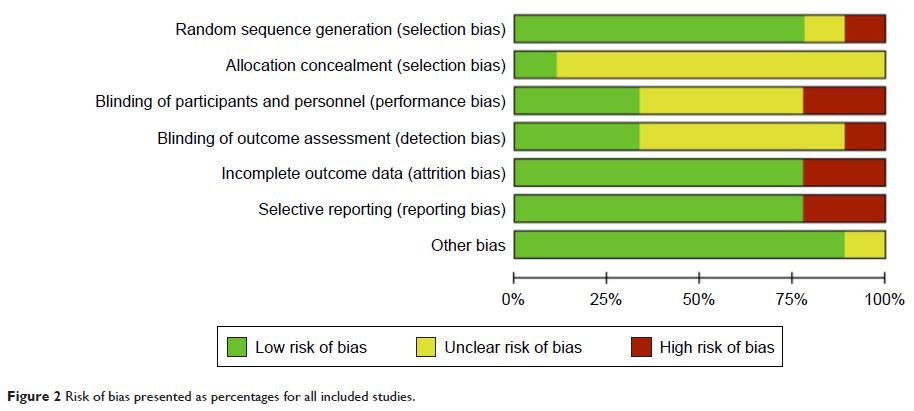108985
论文已发表
注册即可获取德孚的最新动态
IF 收录期刊
- 3.4 Breast Cancer (Dove Med Press)
- 3.2 Clin Epidemiol
- 2.6 Cancer Manag Res
- 2.9 Infect Drug Resist
- 3.7 Clin Interv Aging
- 5.1 Drug Des Dev Ther
- 3.1 Int J Chronic Obstr
- 6.6 Int J Nanomed
- 2.6 Int J Women's Health
- 2.9 Neuropsych Dis Treat
- 2.8 OncoTargets Ther
- 2.0 Patient Prefer Adher
- 2.2 Ther Clin Risk Manag
- 2.5 J Pain Res
- 3.0 Diabet Metab Synd Ob
- 3.2 Psychol Res Behav Ma
- 3.4 Nat Sci Sleep
- 1.8 Pharmgenomics Pers Med
- 2.0 Risk Manag Healthc Policy
- 4.1 J Inflamm Res
- 2.0 Int J Gen Med
- 3.4 J Hepatocell Carcinoma
- 3.0 J Asthma Allergy
- 2.2 Clin Cosmet Investig Dermatol
- 2.4 J Multidiscip Healthc

右美托咪定可减少心脏手术后的心房颤动吗?系统评价和荟萃分析
Authors Zhu ZP, Zhou HM, Ni YJ, Wu C, Zhang CJ, Ling XY
Received 12 October 2017
Accepted for publication 26 January 2018
Published 12 March 2018 Volume 2018:12 Pages 521—531
DOI https://doi.org/10.2147/DDDT.S153834
Checked for plagiarism Yes
Review by Single-blind
Peer reviewers approved by Dr Amy Norman
Peer reviewer comments 2
Editor who approved publication: Dr Georgios Panos
Purpose: Cardiac surgery patients always present with atrial fibrillation
(AF) after admission to the intensive care unit, leading to high mortality and
lengthy hospitalization. Dexmedetomidine (DEX) is a popular medication used for
sedation in the intensive care unit; however, whether it can reduce AF needs to
be analyzed.
Materials and
methods: Three primary databases, Medline,
Embase (Ovid SP) and the Cochrane Central Register of Controlled Trials
(CENTRAL), were searched. All English language and randomized control designed
clinical publications comparing DEX to control medicines for sedation after
elective cardiac surgery were included. Two independent colleagues conducted
the data extraction and quality assessments. The subgroup analysis was
performed according to the medicine used, age, AF history, and whether previous
beta-blocker premedication and cardiopulmonary bypass (CPB) were applied. The
overall incidence of AF was analyzed.
Results: A total of 1,295 patients in nine studies met the selection
criteria among 2,587 studies screened from the database. After quantitative
synthesis, our results revealed that the DEX group was not associated with a
decreased incidence of AF compared with the placebo (risk ratio [RR] 0.76, 95%
CI 0.37, 1.55, P =0.44) and
morphine groups (RR 0.86, 95% CI 0.56, 1.31, P =0.48).
Subgroup analysis also indicated that the DEX vs propofol comparison exhibited
no difference: 1) for patients of age >60 years (P =0.69)
or ≤60 years (P =0.69); 2) under CPB surgery (P =0.45) or without CPB surgery (P =0.88); 3) with beta-blocker
premedication (P =0.32) or without beta-blocker
premedication (P =0.90); and 4) with AF history
(RR 1.07, 95% CI 0.85, 1.36, P =0.57) or without
AF history (P =0.30).
Conclusion: This meta-analysis revealed that DEX could not reduce the
incidence of AF compared to control medicines following cardiac surgery. DEX
may have an increased influence on AF occurrence if patients had a history of
AF. However, cautious interpretation should be made due to high clinical
heterogeneity.
Keywords: dexmedetomidine, sedation, cardiac surgery, atrial fibrillation
